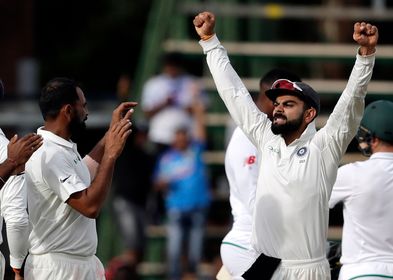Post 2000, Indian cricket has shown a steady improvement. Sure, there have been setbacks like in 2011 when India lost to both England and Australia 4-0, but, generally, the graph has been northbound.
If Sourav Ganguly, as India captain, brought self-esteem to Team India with the way they competed overseas, Mahendra Singh Dhoni injected calmness under pressure into Indian cricket.
In the 1990s, India would lose many a close match out of sheer anxiety. Think of the the 1992 World Cup game against Australia in Brisbane—a classic case of nerves getting the better of the team.
With Dhoni gone as captain, Virat Kohli has taken over the reins of Indian cricket. He is still young as captain, but what has become evident is that he is bringing a quality into Indian cricket that was never seen before. The ‘never say die attitude’, and this was so visible in the last Test of the series against South Africa. India had lost the Test series when they came to the Wanderers to play this final Test, but they played this inconsequential game as if their lives depended on it.
It was a poor pitch, bordering on dangerous. Balls were rearing up from good length and batsmen were getting hit on their hands and ribs regularly. The physios of both teams would have lost a few pounds from the many runs they had to make on to the field to attend to the batsmen’s bruises.
But India was very happy, in fact, very keen to carry on playing even after the umpires had clearly hinted that they would be okay if the teams did not want to continue playing on that surface. Every time an Indian batsman got hit, he would immediately let the officials know that he was fine and wanted to continue. And, the captain led from the front in this regard.
My heart went out to them. Watching them fight this way, especially in a dead rubber, the desperation to still win a Test, made me feel really proud of this Indian team. It was a unique Test win for India in the end. One I will always remember for the courage shown on a treacherous pitch in an already lost series. It would have been so easy to take the other option and finish 2-0, but, no, they wanted it to be 2-1.
I guess Virat wanted the win to regain some self-respect and the others had no choice but to follow him. Yes, Virat has that kind of hold on this team. He leads and the others follow, wherever he takes them.
When the one-day series of six matches started after the Test series, at the toss, Virat used the win in the last Test to gain a psychological advantage over his opponents. He went out of his way to say that his team was very confident after the last Test win and kept highlighting that fact in all his talks. Anyone would think, it was India, and not South Africa, who had won the Test series. Virat had created that kind of a mood. The value of that last Test win, seemingly meaningless, came through in the one-day series.
Come the one-dayers, the South African captain confessed that the last Test had taken a lot out of his team. Keeping these tenacious Indians at bay had taken its toll on the South Africans. India won the one-day series 5-1.
This result had a lot to do with the ‘never say die attitude’ that India showed in the last Test.
Manjrekar, former cricketer, is a commentator.
editor@theweek.in


